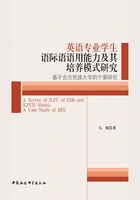
Abstract
Interlanguage pragmatics(ILP)was a newly arising subject in the 1980s,pioneered by Kasper's Pragmatische Aspektein der Interimsprache(1981).As a second-generation hybrid of two different disciplines—SLA and pragmatics,it,on the one hand,investigates the pragmatic phenomena and features together with the formative and developing rules concerned in nonnative speakers' interlanguage(IL),and on the other hand,explores native speakers' stylistic varieties of intercultural IL formed through language contact,the conditions for interlanguage formation and change,the relationship between IL and the source language,the communicative effects of IL,and the like.The past three decades have witnessed a promising increase in ILP research.But the focus is mainly on nonnative speakers' pragmatic features of the target language rather than on the formation and development of their pragmatic competence(PC),or on that of L2 and/or L3.Though it is evident that the development of such competence is of paramount importance,it has been neglected in traditional foreign language teaching and learning practice for a long time and the development of students' pragmatic competence has not been paid due attention to,to say nothing of the research of English majors' interlanguage pragmatic competence development(ILPCD)in ethnic universities(EU)in the Chinese context.Considering this,this research is intended to be a cross-sectional case study of Beifang Ethnic University on the ILPC of English majors and its development model in EU,applying the theories of speech acts,conversational principles(CP & PP),face-work,IL,pragmatic transfer,pragmatic fossilization,cognition,adaptation,intercultural communication,and so forth.
Ethnic universities are definitely a unique feature of tertiary education in China,and so is the teaching and learning of the English specialty concerned.Out of the 55 ethnic minorities,53 have their own ethnic languages and 29 have their own writing systems.The language family covers at least five ones,i.e.the Sino-Tibetan,the Altai,the South Asiatic,the Indo-European,and the South Island.Besides,there are even two ethnic languages whose identities have not been determined(cf.Appendix IV).Their writing systems vary from the logographic,the syllabic,to the alphabetic.Some even have two or four writing systems(e.g.Mongols and Dai,respectively).Diachronically and synchronically,all the ethnic minority groups have experienced mutual ethnographic communication,influencing one another,including the Han Chinese,both in language and culture;thus some cultural features are found to be shared.Meanwhile,due to typological differences,deeprooted variations are also in existence.Even within the same language family,branch,or group,there exist differences both in language and subculture.And these fossilized typological differences and ethnographic variations are endowed with the features of parasites and transferabilities in the pragmatic aspects of the English language as an L2 and/or L3 for ethnic learners of English in EU.In other words,for ethnic minority learners of English as a whole(excluding the linguistically acculturated Hui,Manchu,and Tujia learners in this study),they are doomed to suffer both the mother tongue interference and that of the official language,Chinese,linguistically and culturally.As a result,ethnic universities have their special characteristics,and accordingly the teaching and learning of the English specialty has its own unique features and complexities.Thus,there is no established model for us to follow.In tune with Thomas(1983),the present research hypothesizes that ethnicity is a key factor affecting English language learning and the ILPCD at issue and that the overall PC of English majors' in EU is far from satisfactory.Based on such hypotheses,the research is conducted with the following three questions as the key issues:
1.What is the current situation of the IL pragmatic development of English majors in ethnic universities?
2.What problems and weaknesses are there in the ethnic minority English majors' development of their IL pragmatic competence?
3.How can the problems and the weaknesses identified be dealt with?
The findings of our research provided answers to the above three questions as expected and supported our hypotheses.With reference to the established terminal objective in ILPCD,i.e.accuracy,appropriateness,fluency,and intercultural pragmatic sensitivity,the research revealed that there is a significant correlation between ethnicity and PC performance,and that globally the monolingual Han learners of English outperformed the other monolingual and bilingual ethnic minority learners,i.e.HAN>HMT>OTH,but locally the monolingual HMT and the bilingual OTH varied in pragmalinguistic aspect(PM)and/or sociopragmatic aspect(SP),which proved further the complexities of English language teaching in EU.The research also illustrated that learners' pragmatic failure in PM and SP varies with regard to formulaic linguistic competence,interactional competence,metaphoric competence,sociocultural competence,discourse competence,and strategic competence.The present research holds that the differences and variations examined do not reveal that there exists established superiority of a certain ethnic group in learning a foreign language or that it is fundamentally necessary to change the ethnic learners' ethno-cultural identity with an intention of cultural imperialism,but that it is urgent to develop ethnic English majors' ILPC in terms of pragmatic teaching intervention so that they would adapt themselves efficiently to the target language and culture in intercultural communication,since ethnicity is a key factor affecting ILPCD.Thus,to effectively improve ethnic learners' ILPC,the present research proposes the theme-based instructional model and some corresponding strategies.
As a large unified multi-national state,China has 55 ethnic minority groups covering more than 67% of its total territory.But for historical and geographical reasons,they usually reside in the thinly populated and isolated rural regions or areas.It is an obligation of ethnic universities to train intellectuals for ethnic minority groups and ethnic minority regions to promote their development.Therefore,the present research is not only significant in practice but valuable in theory,for teaching,learning,syllabus revision,coursebook compilation,teacher training and development,and teaching and learning reform,in ethnic universities.
Key words:English teaching and learning of English specialty in ethnic universities,interlanguage pragmatic competence,developmental model,teaching & learning strategies,pragmatic transfer